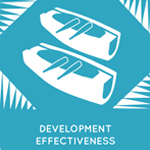Development Effectiveness

PIANGO along with other global CSOs actively engaged in the global development cooperation discourse as well as the international aid effectiveness agreements leading up to the Busan 4th High Level Forum on Aid Effectiveness and thereafter in the Post 2015 development agenda negotiations. As a global CSO leader in the Busan Partnership, PIANGO will continue to champion the advocacy to focus on development effectiveness in the Pacific Islands region in relation to aid effective-ness, development cooperation and the implementation of Agenda 2030.
PIANGO will actively engages the Pacific Secretariat in the Global CSO Partnership for Development Effectiveness (CPDE) which brings together CSOs from the local to the global level to promote the realisation of human rights, social justice, equality and sustainability in development as a whole as well as in its own work as voluntary organizations through the application of principles, methods and strategies and in mechanisms and initiatives for development effectiveness especially in development cooperation. It will also continue to seek partnerships with other Global CSO actors within the regional and internationally focusing on the universal implementation of the Agenda 2030 and COP21 obligations.
Given the Pacific region’s uniqueness as Small Islands Developing States, its vulnerability in the frontline of the negative impacts of climate change and the onslaught of globalization, PIANGO is calling for are thinking of development in the Pacific Islands by Pacific Islands peoples ourselves in the context that the our region has the highest level of aid per capita compared to the rest of the world, yet as a region, we are off-track and show mixed results in achieving the MDGs by 2015. Poverty is increasing, high gender inequality and gender based violence, rising sea levels and the negative impacts of climate change have threatened our livelihoods, there is low economic growth, an expanding youth bulge with fewer jobs.
The PIANGO network actively engaged in the global CSO preparations for the 2011 Busan Fourth High Level Forum on Aid Effectiveness. The 2010 Special PIANGO Council meeting endorsed PIANGO’s engagement with the Open Forum for CSO Development. In April 2010, a national consultation was held in Suva, Fiji, followed by a regional consultation in Tonga in May 2010 which was the basis of the Pacific Islands submission collated with consultations from 80 other countries on CSO principles for development. All these were collated in to a set of 8 global principles and adopted at the global CSO Assembly at which PIANGO was represented and now known as the Istanbul Principles.
Objective 2.1: Strengthening CSO Accountability processes
The Istanbul Principles were further developed into a Framework that was adopted at the global CSO Assembly, again at which PIANGO was represented in Siem Reap, Cambodia in June2011.This is now known as the Siem Reap Consensus on the International Framework for CSO Development Effectiveness.
The International Framework comprises of three parts – the Istanbul Principles for CSO Development Effectiveness; the standards by which CSO’s will hold themselves accountable and the enabling environment conditions which are necessary for CSO development effectiveness.
PIANGO will apply the Istanbul Principles to the Pacific context and partner with the Australia Council for International Development (ACFID) and the Council for International Development (CID) of New Zealand for the development of a PIANGO Code to guide Ethical Practice, application of Professional Standards and a self-regulating accountability mechanism for Pacific CSOs who are PIANGO members. At the same time, PIANGO will advocate for enabling environment (EE) conditions with pacific governments especially with respect to regulatory and policy mechanisms affecting the operations and registration of CSOs
PIANGO will develop a PIANGO Code of Ethical Practice to improve development effectiveness of PIANGO and its members. PIANGO will work with ACFID and CID which operate a code of good governance and practice that applies to their membership. This Code gives our partners confidence that NGOs are operating with good financial processes and that they are accountable both to their beneficiaries and to donors alike. The development and introduction of a PIANGO Code of Practice based on minimum standards and the Istanbul Principles
PIANGO and its NLUs will modify the ACFID Code to suit the Pacific Islands (and specific NLU) context. PIANGO will begin with 4 countries as pilot. The experience and learning from these countries will be shared and applied to the next lot of 6 countries to embrace the Code of Practice.
Key Objectives:
- To improve CSO accountability and good governance through the development and promotion og a code of minimum standards of CSO accountability and development effectiveness for CSO sector in the target countries of 3 sub regions
- Multi stakeholders accountability
- Build more stable systems for information and knowledge sharing
